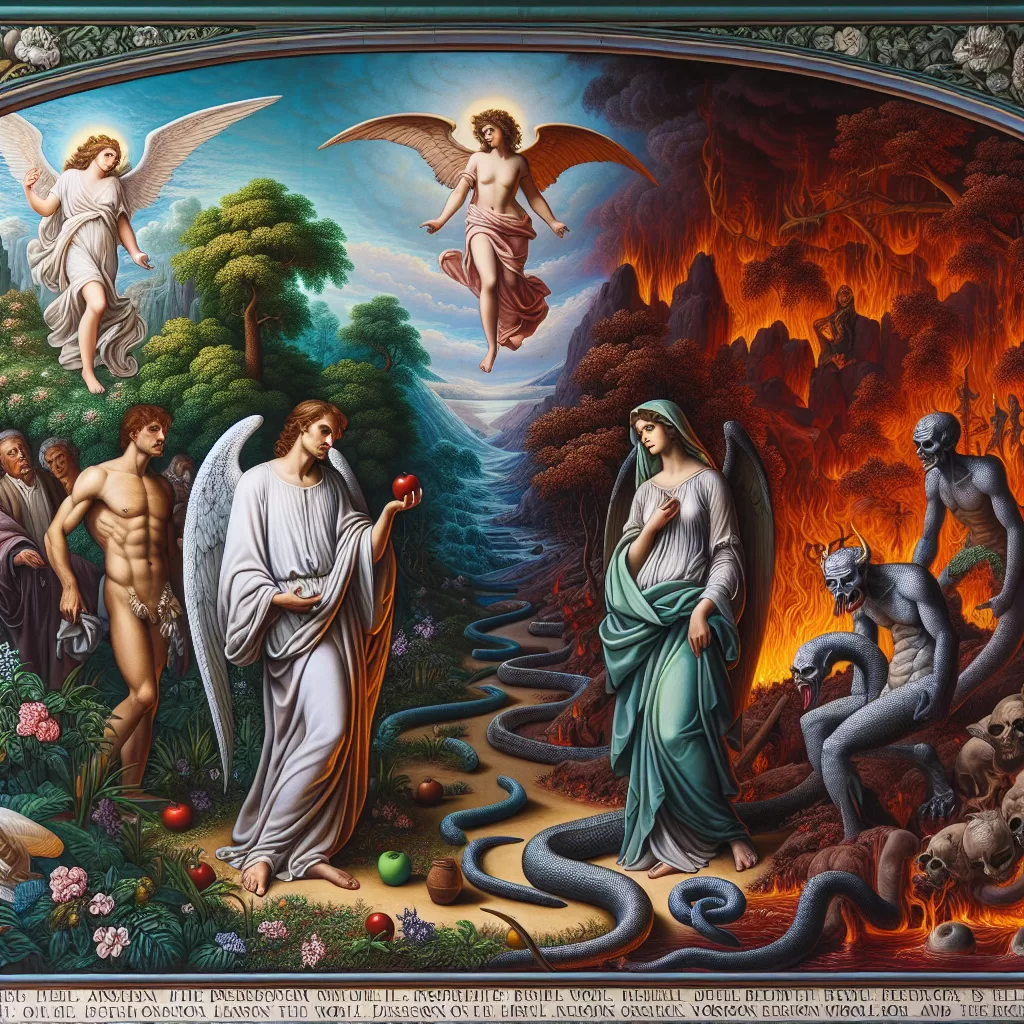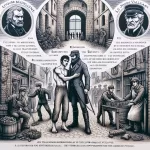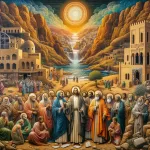-
Indice dei contenuti
- Riassunto del Paradiso perduto
- I temi principali del Paradiso perduto
- Analisi del personaggio di Satana nel Paradiso Perduto
- Il ruolo di Adamo ed Eva nel Paradiso perduto
- Il concetto di libero arbitrio nel Paradiso perduto
- The Influence of Classical Literature on Paradise Lost
- Il simbolismo del paradiso nel Paradiso perduto
- DOMANDE E RISPOSTE
“Paradise Lost,” an epic poem by John Milton, explores the biblical story of the Fall of Man, detailing the rebellion of Satan and the subsequent expulsion of Adam and Eve from the Garden of Eden. The poem is structured in twelve books and delves into themes of free will, obedience, and the nature of good and evil. Milton’s rich characterizations include the tragic figure of Satan, the innocent yet flawed Adam, and the complex Eve, each embodying various aspects of humanity’s struggle with temptation and redemption. Through its intricate narrative and profound philosophical inquiries, “Paradise Lost” remains a seminal work in English literature, reflecting the tensions between divine authority and human agency.
Riassunto del Paradiso perduto
“Paradise Lost,” an epic poem by John Milton, is a profound exploration of the biblical story of the Fall of Man, encapsulating themes of free will, obedience, and redemption. The narrative unfolds in a grandiose manner, beginning with the rebellion of Satan and his followers, who are cast out of Heaven after a failed insurrection against God. This initial conflict sets the stage for the subsequent events that lead to humanity’s downfall. Milton’s portrayal of Satan is particularly striking; he is depicted as a complex character, embodying both charisma and malevolence. His famous declaration that it is “better to reign in Hell than serve in Heaven” encapsulates his defiance and ambition, establishing him as a tragic figure who, despite his villainy, evokes a degree of sympathy.
As the poem progresses, the focus shifts to the creation of the world and the introduction of Adam and Eve, the first humans. Milton presents them as innocent and blissful beings living in the Garden of Eden, a paradise filled with beauty and abundance. However, the tranquility of Eden is soon disrupted by Satan’s cunning. Disguised as a serpent, he tempts Eve to eat the forbidden fruit from the Tree of Knowledge, an act that symbolizes disobedience and the loss of innocence. This pivotal moment not only leads to their expulsion from Paradise but also serves as a critical commentary on the nature of free will. Milton suggests that the ability to choose, even when it leads to disastrous consequences, is an essential aspect of humanity.
The consequences of Adam and Eve’s actions reverberate throughout the poem, illustrating the theme of loss and the inherent struggle between good and evil. After their transgression, they experience shame and guilt, emotions that were previously foreign to them. Their expulsion from Eden marks a significant turning point, as they must now navigate a world filled with suffering and hardship. Yet, even in their despair, there is a glimmer of hope. Milton emphasizes the possibility of redemption through repentance and faith, suggesting that while sin has entered the world, the potential for salvation remains.
Moreover, the poem delves into the dynamics of gender and the roles of Adam and Eve. Milton portrays Eve as both a companion and a figure of temptation, raising questions about the nature of responsibility and agency. Adam’s subsequent choice to join Eve in her disobedience highlights the complexities of love and loyalty, as he prioritizes his bond with her over his obedience to God. This interplay between the characters adds depth to the narrative, inviting readers to reflect on the moral implications of their choices.
In conclusion, “Paradise Lost” serves as a rich tapestry of themes and characters that resonate with the human experience. Through its exploration of free will, the nature of good and evil, and the quest for redemption, Milton crafts a narrative that transcends its biblical origins. The poem not only recounts the story of humanity’s fall but also invites readers to ponder the enduring questions of existence, morality, and the possibility of grace. As such, “Paradise Lost” remains a seminal work in the canon of English literature, offering insights that continue to inspire and challenge readers to this day.
I temi principali del Paradiso perduto
“Paradise Lost,” John Milton’s epic poem, delves into profound themes that explore the complexities of human existence, morality, and the nature of divine authority. One of the most prominent themes is the concept of free will, which serves as a cornerstone for the narrative. Milton presents the idea that humans possess the ability to choose between good and evil, a notion that is vividly illustrated through the characters of Adam and Eve. Their decision to disobey God by eating the forbidden fruit not only leads to their expulsion from Eden but also underscores the weight of personal choice and its consequences. This theme resonates throughout the poem, as it raises questions about predestination and the extent to which divine foreknowledge influences human actions.
Another significant theme in “Paradise Lost” is the exploration of obedience and rebellion. The poem contrasts the obedience of the heavenly hosts, particularly the archangel Michael, with the rebellion of Satan and his followers. Satan’s defiance against God is portrayed as a tragic flaw, leading to his ultimate downfall. This theme invites readers to reflect on the nature of authority and the consequences of rebellion against it. Milton’s depiction of Satan as a charismatic yet flawed leader complicates the traditional view of good and evil, prompting readers to consider the motivations behind rebellion and the allure of power.
Furthermore, the theme of redemption plays a crucial role in the narrative. Milton suggests that despite the fall of humanity, there remains a path to salvation through repentance and faith. The promise of redemption is embodied in the figure of Jesus Christ, who is foreshadowed throughout the poem. This theme emphasizes the idea that while sin may lead to suffering, the possibility of redemption offers hope and a means to restore the lost relationship between humanity and the divine. The interplay between sin and redemption serves to highlight the complexities of the human condition, illustrating that even in the face of despair, there exists the potential for grace.
Additionally, the theme of knowledge and its consequences is intricately woven into the fabric of the poem. The pursuit of knowledge, as exemplified by Adam and Eve’s desire to gain wisdom through the forbidden fruit, ultimately leads to their downfall. Milton presents knowledge as a double-edged sword; while it can lead to enlightenment, it can also result in suffering and alienation from God. This theme raises important questions about the nature of knowledge itself and its implications for human existence. It suggests that the quest for understanding must be tempered with humility and reverence for divine authority.
Moreover, the theme of gender roles and the dynamics between Adam and Eve are explored throughout the poem. Milton’s portrayal of Eve as both a companion and a temptress reflects the complexities of gender relationships in the context of obedience and sin. The interactions between the two characters reveal underlying tensions regarding power, responsibility, and the nature of temptation. This theme invites readers to consider the societal implications of gender roles and the ways in which they shape human behavior and relationships.
In conclusion, “Paradise Lost” encompasses a rich tapestry of themes that delve into the intricacies of free will, obedience, redemption, knowledge, and gender dynamics. Through its exploration of these themes, Milton invites readers to engage with fundamental questions about morality, authority, and the human experience. The poem remains a timeless reflection on the struggles inherent in the pursuit of understanding and the quest for a meaningful existence in a world fraught with challenges.
Analisi del personaggio di Satana nel Paradiso Perduto
In John Milton’s epic poem “Paradise Lost,” the character of Satan emerges as one of the most complex and compelling figures in literary history. His portrayal transcends the traditional depiction of evil, inviting readers to explore themes of ambition, rebellion, and the nature of free will. Initially, Satan is presented as a charismatic leader, a fallen angel who, despite his expulsion from Heaven, retains a sense of grandeur and determination. This duality is crucial to understanding his character; he embodies both the tragic hero and the archetypal villain, which complicates the reader’s perception of good and evil.
Satan’s journey begins in the aftermath of his rebellion against God, where he finds himself in the desolate realm of Hell. Rather than succumbing to despair, he rallies his fellow fallen angels, demonstrating his natural leadership qualities. This ability to inspire loyalty and camaraderie among his followers highlights his magnetic personality, which is a significant aspect of his character. As he famously declares, “Better to reign in Hell than serve in Heaven,” Satan’s pride and ambition become evident. This statement encapsulates his refusal to accept subservience, revealing a profound desire for autonomy and power. His rebellion is not merely against divine authority but also a quest for self-definition, making him a figure of both admiration and revulsion.
Moreover, Satan’s character is marked by a profound sense of isolation. Although he leads his fellow fallen angels, he is ultimately alone in his defiance. This loneliness is exacerbated by his awareness of the consequences of his actions, as he grapples with the loss of divine grace and the eternal punishment that awaits him. This internal conflict adds depth to his character, as he oscillates between moments of self-doubt and fierce determination. His soliloquies often reveal a tortured psyche, reflecting the struggle between his ambition and the inherent emptiness of his rebellion. This complexity invites readers to empathize with him, even as they recognize the destructive nature of his choices.
As the narrative progresses, Satan’s character evolves further, particularly in his interactions with other characters, such as Adam and Eve. His cunning and manipulative nature come to the forefront as he devises a plan to corrupt humanity. In his guise as the serpent, he embodies temptation, appealing to Eve’s curiosity and desire for knowledge. This transformation underscores his adaptability and resourcefulness, traits that make him a formidable antagonist. However, it also highlights a critical aspect of his character: the use of deception as a means to achieve his ends. This reliance on trickery raises questions about the nature of evil and the moral implications of his actions.
In conclusion, Satan in “Paradise Lost” serves as a multifaceted character whose complexity challenges conventional notions of good and evil. His ambition, charisma, and internal struggles create a rich tapestry that invites readers to reflect on themes of free will, rebellion, and the consequences of one’s choices. While he embodies the archetype of the fallen angel, his tragic heroism elicits both admiration and horror, making him a timeless figure in literature. Through Satan, Milton not only explores the nature of sin but also delves into the human condition, prompting readers to consider the delicate balance between ambition and morality. Ultimately, Satan’s character serves as a powerful reminder of the complexities inherent in the struggle between light and darkness, freedom and servitude.
Il ruolo di Adamo ed Eva nel Paradiso perduto
In John Milton’s epic poem “Paradise Lost,” the characters of Adam and Eve serve as pivotal figures whose actions and decisions drive the narrative and embody the central themes of the work. Their roles are intricately woven into the fabric of the poem, illustrating the complexities of free will, obedience, and the human condition. Adam, as the first man created by God, is depicted as a figure of innocence and nobility. He is endowed with reason and intellect, which allow him to engage in profound contemplation about his existence and the nature of his relationship with God. Eve, on the other hand, is portrayed as a beautiful and intelligent being, created from Adam to be his companion. Her creation signifies the importance of companionship and the ideal of partnership in the divine order.
As the narrative unfolds, the relationship between Adam and Eve becomes a focal point for exploring themes of love, loyalty, and the consequences of disobedience. Their initial state in the Garden of Eden is one of harmony and bliss, where they enjoy a direct communion with God and live in a paradise free from sin. However, this idyllic existence is threatened by the introduction of temptation, personified by Satan, who seeks to undermine their faith and obedience to God. The serpent’s cunning persuasion leads Eve to question the divine command regarding the forbidden fruit, ultimately resulting in her decision to partake of it. This act of disobedience not only alters the course of their lives but also serves as a catalyst for the fall of humanity.
Adam’s response to Eve’s transgression is significant, as it highlights the themes of love and sacrifice. Despite knowing the consequences of eating the forbidden fruit, Adam chooses to follow Eve into sin rather than remain in paradise without her. This decision underscores the depth of his love for Eve but also raises questions about the nature of free will and the responsibility that comes with it. Milton presents Adam’s choice as a tragic flaw, illustrating how love can lead to both profound connection and devastating consequences. The couple’s fall from grace marks a pivotal moment in the poem, as they transition from a state of innocence to one of knowledge and awareness, forever altering their relationship with God and each other.
Furthermore, the aftermath of their disobedience reveals the complexities of their characters. Adam and Eve grapple with guilt, shame, and the realization of their vulnerability. Their banishment from Eden serves as a poignant reminder of the fragility of human existence and the weight of moral choices. In their new reality, they must confront the consequences of their actions, which include not only their separation from paradise but also the introduction of suffering and death into the world. This transformation from innocence to experience is a central theme in “Paradise Lost,” as it reflects the broader human struggle with temptation, sin, and redemption.
In conclusion, the roles of Adam and Eve in “Paradise Lost” are essential to understanding the poem’s exploration of free will, love, and the human condition. Their relationship encapsulates the tension between obedience and desire, while their fall serves as a profound commentary on the complexities of human nature. Through their experiences, Milton invites readers to reflect on the moral implications of choice and the enduring quest for redemption in a world marked by loss and longing. Ultimately, Adam and Eve’s journey is not merely a tale of downfall but also a testament to the resilience of the human spirit in the face of adversity.
Il concetto di libero arbitrio nel Paradiso perduto
In John Milton’s epic poem “Paradise Lost,” the concept of free will emerges as a central theme that intricately weaves through the narrative, shaping the characters’ actions and the overarching moral framework of the text. At its core, free will in “Paradise Lost” serves as a vehicle for exploring the nature of human choice, the consequences of those choices, and the relationship between divine sovereignty and human agency. Milton presents free will not merely as a philosophical abstraction but as a fundamental aspect of the human condition, one that defines the characters’ struggles and ultimately leads to their downfall.
The poem opens with the rebellion of Satan, who embodies the exercise of free will in its most extreme form. His choice to defy God and seek power for himself sets the stage for the ensuing conflict. This act of rebellion is not portrayed as a mere act of defiance; rather, it is a conscious decision made in the pursuit of autonomy. Satan’s assertion of free will is both a source of his strength and his tragic flaw. As he famously declares, “Better to reign in Hell than serve in Heaven,” he reveals a profound misunderstanding of freedom. While he believes he is exercising his will, he is, in fact, ensnared by his own pride and ambition, illustrating the paradox of free will: the very act of choosing can lead to one’s own destruction.
In contrast to Satan, Adam and Eve represent the potential for free will to be exercised in harmony with divine will. Their creation is marked by the gift of free choice, which allows them to love and serve God willingly rather than out of compulsion. However, this gift comes with the burden of responsibility. The pivotal moment in the poem occurs when Eve, driven by curiosity and the desire for knowledge, chooses to eat from the Tree of Knowledge. This act of disobedience not only alters the course of their lives but also signifies the fragility of human free will. Milton suggests that while free will is a divine gift, it is also a double-edged sword, capable of leading to both enlightenment and despair.
Moreover, the consequences of Adam and Eve’s choices extend beyond their immediate experience. Their fall from grace introduces the concept of original sin, which has profound implications for humanity. Milton’s portrayal of free will emphasizes that the choices made by individuals can reverberate through generations, affecting the collective fate of humankind. This notion invites readers to reflect on the weight of their own decisions and the moral responsibility that accompanies the exercise of free will.
As the narrative unfolds, the theme of redemption emerges, suggesting that while free will can lead to sin, it also opens the door to repentance and salvation. The character of Jesus, who embodies divine grace, offers a path to redemption for humanity. This duality reinforces the idea that free will is not merely a license for chaos but a means through which individuals can seek forgiveness and restoration. In this way, Milton presents free will as a complex interplay between choice, consequence, and divine mercy.
Ultimately, “Paradise Lost” serves as a profound exploration of free will, illustrating its capacity to shape destinies and define moral landscapes. Through the choices of its characters, the poem invites readers to grapple with the implications of their own free will, urging a deeper understanding of the balance between autonomy and accountability. In this intricate tapestry of human experience, Milton masterfully captures the essence of free will as both a gift and a challenge, one that continues to resonate with audiences across time.
The Influence of Classical Literature on Paradise Lost
John Milton’s “Paradise Lost” stands as a monumental work in the canon of English literature, not only for its intricate narrative and profound themes but also for its deep-rooted connections to classical literature. The influence of classical texts is evident throughout Milton’s epic, as he weaves together elements from ancient Greek and Roman works to enrich his portrayal of biblical events and characters. This intertextuality serves to elevate the narrative, providing a framework that resonates with the intellectual traditions of antiquity while simultaneously engaging with the theological and moral questions of his own time.
One of the most significant classical influences on “Paradise Lost” is the epic tradition itself, particularly the works of Homer and Virgil. Milton adopts the epic form, characterized by its grand themes, elevated language, and heroic characters, to explore the fall of man and the nature of free will. The invocation of the Muse at the beginning of the poem mirrors the classical epics, establishing a connection to the divine inspiration that guides the poet. Furthermore, Milton’s use of blank verse, a hallmark of both Homeric and Virgilian epics, allows for a fluid and dynamic expression of complex ideas, enhancing the poem’s lyrical quality.
In addition to structural elements, Milton draws upon classical mythology to deepen the thematic resonance of his narrative. For instance, the character of Satan can be seen as a modern reinterpretation of figures from classical literature, such as Prometheus, who defies divine authority and suffers the consequences of his rebellion. This parallel not only highlights the tragic dimensions of Satan’s character but also invites readers to reflect on the nature of ambition, pride, and the quest for knowledge. By situating his characters within a framework that echoes classical themes, Milton encourages a dialogue between the ancient and the modern, prompting readers to consider the moral implications of their actions.
Moreover, the philosophical underpinnings of “Paradise Lost” are heavily influenced by classical thought, particularly the works of Plato and Aristotle. Milton grapples with concepts of justice, virtue, and the nature of the soul, drawing on Platonic ideals to explore the relationship between humanity and the divine. The notion of free will, a central theme in the poem, is examined through a lens that reflects Aristotelian ethics, emphasizing the importance of moral choice and personal responsibility. This engagement with classical philosophy not only enriches the narrative but also situates Milton’s work within a broader intellectual tradition, inviting readers to ponder the complexities of human existence.
Furthermore, the use of allegory in “Paradise Lost” can be traced back to classical literature, where allegorical figures often embody abstract concepts. Milton’s portrayal of characters such as Sin and Death serves as a continuation of this tradition, allowing him to explore profound theological ideas through personification. This technique not only enhances the poem’s moral and philosophical dimensions but also aligns Milton with the allegorical practices of ancient poets, reinforcing the timeless nature of his themes.
In conclusion, the influence of classical literature on “Paradise Lost” is both profound and multifaceted. Through the adoption of epic conventions, engagement with classical mythology, and exploration of philosophical ideas, Milton creates a rich tapestry that resonates with the intellectual heritage of antiquity. This intertextual dialogue not only elevates the narrative but also invites readers to reflect on the enduring questions of morality, free will, and the human condition, ensuring that “Paradise Lost” remains a vital work in the landscape of literary history.
Il simbolismo del paradiso nel Paradiso perduto
In John Milton’s epic poem “Paradise Lost,” the concept of paradise serves as a multifaceted symbol that encapsulates the themes of innocence, temptation, and the human condition. The Garden of Eden, depicted as a pristine and idyllic setting, represents not only the physical realm of untainted beauty but also the spiritual state of humanity before the Fall. This paradise is characterized by its lush landscapes, harmonious existence, and the absence of sin, which collectively embody the ideal state of being that humanity once enjoyed. However, as the narrative unfolds, the symbolism of paradise becomes increasingly complex, reflecting the tension between divine order and human free will.
The initial portrayal of Eden is one of perfection, where Adam and Eve live in a state of blissful obedience to God. This idyllic environment symbolizes the purity and innocence of humanity, as well as the divine grace bestowed upon them. The garden is filled with vibrant flora and fauna, representing the abundance of life and the interconnectedness of creation. Yet, this paradise is not merely a physical space; it also signifies the spiritual harmony that exists when humanity aligns itself with divine will. The presence of the Tree of Knowledge, however, introduces a critical element of temptation, foreshadowing the impending fall from grace. This tree symbolizes the boundary between innocence and knowledge, highlighting the precarious nature of free will and the consequences that arise from the exercise of choice.
As the narrative progresses, the symbolism of paradise shifts dramatically with the introduction of Satan, who embodies rebellion and the desire for autonomy. His character serves as a catalyst for the exploration of free will, as he tempts Eve to partake of the forbidden fruit. This act of disobedience not only leads to the loss of paradise but also signifies the transition from innocence to experience. The moment Eve and subsequently Adam choose to eat from the Tree of Knowledge marks a profound transformation in their existence, illustrating the inherent conflict between divine command and human desire. The expulsion from Eden symbolizes the loss of innocence and the introduction of suffering, thereby reinforcing the notion that paradise is not merely a physical location but a state of being that can be irrevocably altered by human actions.
Moreover, the symbolism of paradise extends beyond the immediate narrative of Adam and Eve. It serves as a reflection of the broader human experience, encapsulating the struggle between good and evil, as well as the quest for redemption. The loss of paradise is not an end but rather a beginning, as it sets the stage for humanity’s journey toward understanding and reconciliation with the divine. Milton suggests that while paradise may be lost, the potential for redemption remains, emphasizing the importance of repentance and the possibility of regaining a semblance of that original state of grace.
In conclusion, the symbolism of paradise in “Paradise Lost” is rich and layered, serving as a vehicle for exploring profound themes of innocence, temptation, and the complexities of human nature. Through the depiction of Eden, Milton invites readers to reflect on the delicate balance between divine authority and human agency, ultimately suggesting that the journey toward understanding and redemption is an integral part of the human experience. Thus, while paradise may be lost, the quest for its restoration continues to resonate throughout the ages, offering insights into the enduring struggle between light and darkness within the human soul.
DOMANDE E RISPOSTE
1. **What is the main plot of “Paradise Lost”?**
“Paradise Lost” narrates the biblical story of the Fall of Man, detailing the rebellion of Satan and his followers, Adam and Eve’s temptation, and their eventual expulsion from the Garden of Eden.
2. **Who are the central characters in “Paradise Lost”?**
The central characters include Satan, Adam, Eve, God, and the archangel Michael.
3. **What is the primary theme of “Paradise Lost”?**
The primary theme is the conflict between good and evil, exploring free will, obedience, and the nature of sin.
4. **How does Milton portray Satan in “Paradise Lost”?**
Milton portrays Satan as a complex character, initially charismatic and defiant, embodying both tragic heroism and ultimate evil.
5. **What role does free will play in the narrative?**
Free will is crucial, as it emphasizes that Adam and Eve’s choice to disobey God leads to their downfall, highlighting the consequences of their actions.
6. **Qual è il significato del Giardino dell'Eden nel poema?
Il Giardino dell'Eden simboleggia l'innocenza e il paradiso, rappresentando lo stato ideale dell'umanità prima della caduta e della perdita della grazia divina.
7. **In che modo "Paradise Lost" affronta il concetto di redenzione?
Il poema suggerisce che, sebbene l'umanità cada nel peccato, la redenzione è possibile attraverso la fede e l'eventuale venuta di Cristo, offrendo una speranza di salvezza. "Paradiso perduto" esplora i temi del libero arbitrio, dell'obbedienza e della natura del bene e del male attraverso la storia biblica della caduta dell'uomo. Il poema epico approfondisce i personaggi di Satana, Adamo ed Eva, evidenziandone le lotte e le scelte. In definitiva, presenta una visione complessa del rapporto dell'umanità con Dio, sottolineando le conseguenze della disobbedienza e offrendo al contempo un messaggio di speranza e di redenzione attraverso il pentimento e la grazia divina. L'opera rimane una profonda riflessione sulla condizione umana e sull'eterno conflitto tra tentazione e virtù.




